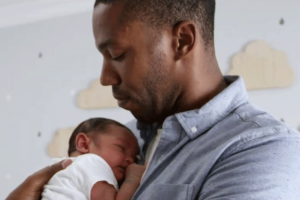The Importance of Fathers in Creating Peace
It is well established fact that fathers are indispensable to the raising of healthy, happy, well- adjusted children. A nurturing, loving, involved father has innumerable benefits on a child that carry far into adulthood. It is also well-known fact that the fathers who nurture love and are involved with their children experience multiple benefits as well.
According to Deirdre Bell in her 2018 article titled On the Importance of Dads..
“Children naturally encourage their parents to broaden their horizons. Fathers who spend a lot of quality time with their children are therefore more likely to form community connections, socialize more, and take leadership positions in their community”
Leadership can take on many forms and is often dictated by the context in which a person is required to lead. Fatherhood requires us not only to lead our children but to serve them as well. The servant-leadership model of fatherhood can be effective in the pursuit of peace for our children.
Robert Greenleaf, the founder of the servant leadership model for business suggests that servant leaders must build communities.
“All that is needed to rebuild community as a viable life form for large numbers of people is for enough servant-leaders to show the way, not by mass movements, but by each servant-leader demonstrating their own unlimited accountability for a specific community related group.”
Community and connection along with collective consciousness are often the binding forces of men especially in war.
Men, and women as well, but primarily men are the practitioners, planners and make up the workforce of organized violence. Men also comprised 88% of all the arrest for murder and manslaughter and 79.3% for all violent crimes in 2019 according to the U.S. Department of Justice Statistics.
Violence, whether collective and organized or random and individual is overwhelmingly committed by men. Sometimes it seems as though we accept these conditions as a fact of life almost as if were bound to happen. In some sense it is bound to happen. In an us versus them, me versus you world, violence is an easily predictable outcome.
Just like armies in the vigorous, organized pursuit of war and individuals in pursuit of selfish gain we need to have fathers who are willing to go after peace with the same passion. What is more important than making the world we want our children to live in?
How much more evidence do we need to know that violence hurts us all? Let’s be warriors for our children’s peace and freedom from the pain of violence and wars. Our connections as dads can help us build that Peace Army. All of us fathers want the best for our children and it going to require new dimensions of connection to one another and bold leadership.
The servant leadership model has tenets that can give us some guidelines as to how we can serve our children and communities and advance the concepts of peace. Consider the nine points below:
- Listening: Leaders have traditionally been valued for their communication and decision-making skills. Although these are important skills for the servant leader, they need to be reinforced by a deep commitment to listening intently to others. The servant leader seeks to identify the will of the group and helps to clarify that will. He or she seeks to listen receptively to what is being said (and not said). Listening also encompasses getting in touch with one’s inner voice, and also seeking to understand what one’s body, spirit and mind are communicating. Listening coupled with regular periods of reflection, are essential to the growth of the servant leader.
- Empathy: The servant leader strives to understand and empathize with others. People need to be accepted and recognized for their special and unique spirits. The most successful servant leaders are those who have become skilled empathetic listeners.
- Healing: The healing of relationships is a powerful force for transformation and integration. One of the great strengths of servant leadership is the potential for healing one’s self and one’s relationship to others. Many people have broken spirits and have suffered from a variety of emotional hurts. Although this is part of being human, servant leaders recognize that they have the opportunity to “help make whole” those with whom they come in contact.
- Awareness: General awareness and especially self- awareness is something that strengthens the servant-leader. Making a commitment to foster awareness can be scary- you never know what you might discover! Awareness also aids one in understanding issues involving ethics and values. It lends itself to being able to view most situations from a more integrated, holistic position.
- Persuasion: Another characteristic of the servant-leader is a reliance on persuasion, rather than one’s positional authority in making decisions within an organization. The servant leader seeks to convince others rather than to coerce compliance. This particular element offers one of the clearest distinctions between the traditional authoritarian model and the one of servant-leadership. The servant leader is effective at building consensus within groups.
- Conceptualization: Servant –leaders seek to nurture their ability to “dream great dreams.” He ability to look at a problem from a conceptualizing perspective means that one must think beyond the day to day realities.
- Foresight: Closely related to conceptualization, the ability to foresee the likely outcome of a situation is hard to define, but easy to identify. One knows it when one sees it. .Foresight is a characteristic that enables the servant leader to understand the lessons from the past and the likely consequences of decisions for the future. It is also deeply rooted in the intuitive mind.
- Stewardship: Servant- leadership like stewardship, assumes first and foremost the needs of others. It also emphasizes the use of openness and persuasion rather than control.
- Commitment to the growth of people: Servant-leaders believe that people have an intrinsic value as people and can contribute to the overall good of the community
As fathers we must become warriors for peace and soldiers for justice. We can move closer to the predictable outcomes that we all desire for our children.




